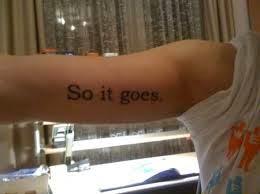Usually when reading a book from the 100 Best Novels of the 20th Century I can easily relate the story to something in my life. My job, family, friends, relationships, or faith often come to mind as I experience a work of literature. For me, this makes the narrative more human - something I can relate to and color through my own experiences.
Then along comes something so freaky deaky that all I can do is scratch my head and wonder what is this author trying to accomplish? Slaughterhouse Five, or The Children's Crusade: A Duty-Dance with Death (1969) by Kurt Vonnegut is one such novel. This semi-autobiographical work is told in non-linear fashion from the perspective of an unreliable, if not completely insane, character. Slaughter House Five circuitously relates the life and misfortunes of an unwilling soldier, Billy Pilgrim, who "does nothing to help himself." Obviously this novel is a satirical, anti-war response to WWII novels and memoirs released in the 1950's that meditated on the horrors of war and rejoiced in the heroic actions of our fighting boys.
That's the easy part to understand. Adding to the confusion, the novel jumps both forward and
 |
| Kurt Vonnegut |
{Spoiler Alert - Stop here if you don't want to know the final plot twist}
This method of story telling is somewhat confusing, but as the story unfolds, Vonnegut slowly reveals the truth about Pilgim's world view and the source of the narrative's strange turns. Having experienced two mental breakdowns and now suffering from dementia Pilgrim now conflates his life experiences with the plots of pulp science fiction novels he read under the influence of drugs during his recovery from his first breakdown. In a way, his life as he now remembers it is like an unrelenting season of the Twilight Zone - full of ironic and unexpected endings and death - lots of death.
{End of Spoiler text}
Although it may not seem like it from the above, I actually quite liked this novel. Vonnegut's writing is clear and concise. Billy Pilgrim, while a buffoon, is ultimately a likeable and sympathetic character. And, even better, the reveal makes you rethink the entire novel.
If my life was to be composed of classic novels, which titles would I choose?
 |
| Life continues despite the death that awaits us. |
 |
| Must add to the Netflix Queue |



